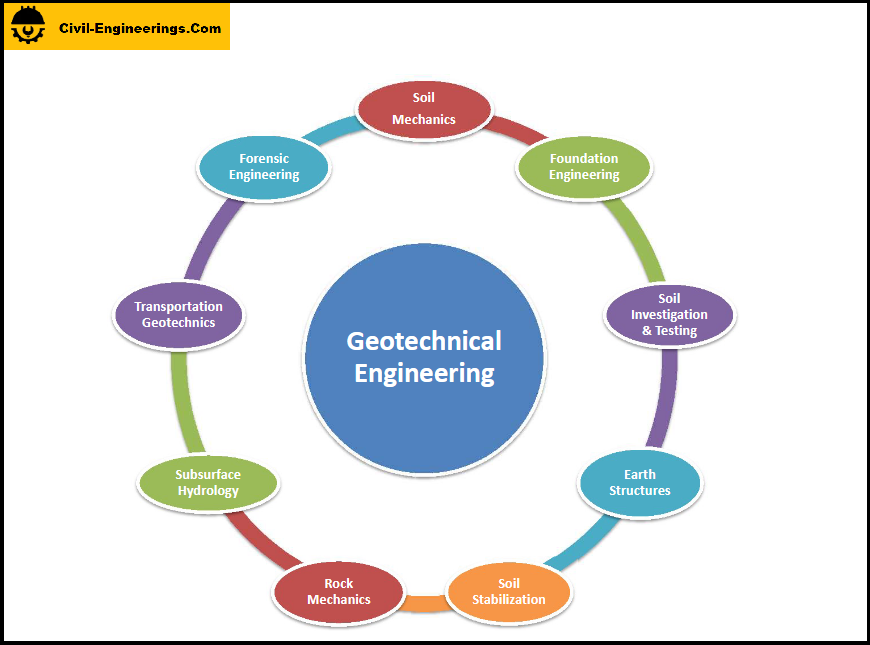Some Known Details About Geotechnical Engineering For Construction Projects
Some Known Details About Geotechnical Engineering For Construction Projects
Blog Article
What Does Geotechnical Engineering For Construction Projects Mean?
Table of ContentsIndicators on Geotechnical Engineering For Construction Projects You Need To Know10 Simple Techniques For Geotechnical Engineering For Construction ProjectsGeotechnical Engineering For Construction Projects - The FactsRumored Buzz on Geotechnical Engineering For Construction ProjectsAn Unbiased View of Geotechnical Engineering For Construction Projects
Throughout the examination, it is essential to pierce at the needed depth and the called for number of holes as per the recommendation of the Canadian Structure Design criterion. Often, the owner could conserve some Geotechnical Investigation price but finish up spending greater than the prepared for during the construction price.The obligations of the geotechnical consultant entail supplying material screening for building support. Geotechnical Engineering for Construction Projects. Geotechnical designers analyse all the field examination records to make sure that construction is going on based on the project requirements. During building and construction, a confirmatory test for dirt compaction is done on-site to ensure that no future negotiation takes place
After the concrete is poured -7 days and 28 days- examinations are carried out on concrete examples collected from the site to make certain that the concrete poured meets the layout standard. Asphalt core is taken after the Asphalt is laid and compressed to validate that it meets the design standard. All lab examination records are evaluated by the Geotechnical Engineer to guarantee that it fulfills the project spec.
The Greatest Guide To Geotechnical Engineering For Construction Projects

Geotechnical engineering plays an important function in making sure the stability of building jobs. Geotechnical engineering is an important branch of civil engineering that focuses on recognizing the practices of planet products, such as soil and rock.

For a dependable foundation and a smooth building and construction process, depend supply the proficiency you require. Call to get expert recommendations and geotechnical services tailored to your next job.
Geotechnical Engineering For Construction Projects Things To Know Before You Get This
When starting a land development job, recognizing the ground underneath your feet is as crucial as the structures you intend to construct above it. Our Geotechnical Design team evaluate the ground, ensuring it appropriates for the recommended advancement while supplying you with the details called for to satisfy your job objectives.
Geotechnical Engineering looks at the formation of the ground, as it is the foundation for all projects. Where structures need to be designed relative to the ground problems; ground problems (e.g., soft ground) might require enhancing depending upon the dimension of the desired structure. Before structure, you require to understand regarding the groundwater, dirt framework, and liquefaction likelihood of your land.
For websites that are not connected on the regional authority facilities added site investigations would be needed to supply technical inputs for on-site stormwater and wastewater. We have experienced Geotechnical Engineers based in each office, supporting your geotechnical requirements nationwide. Get to out to us to review just how we can sustain your following task.
These records are customized to meet the certain demands of a task and include style specifications and advice for the construction of a series of man-made frameworks. Along with giving working as a consultant services covering locations such as slope stability and load-bearing capacities for different materials, these designers take on r & d tasks to enhance methods, tools, products understanding and analysis official site covering entire lifecycles.
Geotechnical Engineering For Construction Projects Fundamentals Explained

Rates of pay usually enhance as your knowledge and skills grow, with standards pointing to a graduate starting salary of in between 18,000 and 28,000 per year in the UK. This rises to 26,000 to 36,000 with a couple of years of experience and after that reaching 40,000 to 60,000+ for senior, legal or master engineers.
With the right application it is possible to grasp the career and gain entry to a difficult yet fulfilling and important profession. A rock hound would certainly need to retrain to end up being a geotechnical designer, web although there is lots of cross-over in between the two occupations, which can make this easier - Geotechnical Engineering for Construction Projects. Geologists need to have an understanding of dirts, rocks and various other products from a clinical viewpoint, while geotechnical engineers tale their understanding of matters such as soil and rock auto mechanic, geophysics and hydrology and use them to design and ecological jobs
When starting out, these designers will certainly often tend to function on much less intricate projects, accumulating expertise and experience all set for more tough job later. Geotechnical engineers tend to specialise in details areas as they grow in experience, concentrating on particular infrastructures such as railways, roadways or water. These designers additionally collaborate with renewable resource, offshore and onshore oil and gas, nuclear power, and a lot more.
Not known Factual Statements About Geotechnical Engineering For Construction Projects
The moment taken to become a geotechnical designer depends on where you are based, where you research and what degree of education have a peek here you desire to attain prior to entering the work environment. Are you going to discover an apprenticeship, take a college degree or work with towards a Master's or PhD? Generally-speaking it takes 3-4 years to reach the fundamental requirements to start a job as a geotechnical engineer.
These operations allow specialists to evaluate a host of soil technicians consisting of weight, porosity, void-to-solid fragment proportion, leaks in the structure, compressibility, optimum shear stamina, bearing capability and contortions. If the structure calls for a deep foundation, engineers will certainly use a cone infiltration examination to estimate the amount of skin and end bearing resistance in the subsurface.
When evaluating an incline's balance of shear anxiety and shear strength, or its capability to withstand and undergo activity, rotational slides and translational slides are frequently taken into consideration. Rotational slides stop working along a bent surface area, with translational slides taking place on a planar surface area. A specialist's goal is to figure out the conditions at which a slope failure can take place.
Usually, searchings for suggest that a site's soil ought to be dealt with to boost its shear strength, stiffness and leaks in the structure prior to style and building and construction. When it comes time to lay out foundation strategies, professionals are increasingly concentrated on sustainability, more specifically just how to minimize a foundation's carbon impact. One technique has been to replace 20 percent of a structure's concrete with fly ash, a waste product from coal fire power plants.
Report this page